Armenian PM Visits Iran Amid Border Disputes With Azerbaijan
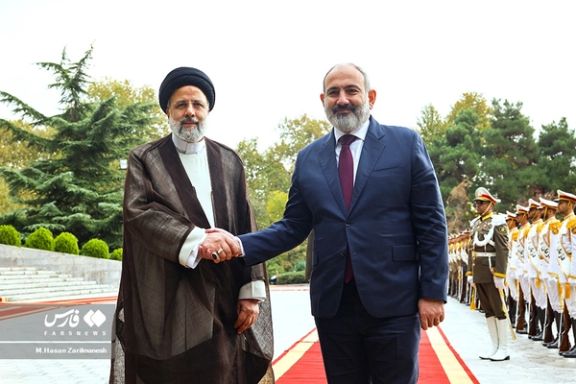
Amid territorial tensions between Armenia and Azerbaijan, the Iranian president hosted Armenia’s premier in Tehran on Tuesday to strengthen relations with Yerevan.

Amid territorial tensions between Armenia and Azerbaijan, the Iranian president hosted Armenia’s premier in Tehran on Tuesday to strengthen relations with Yerevan.
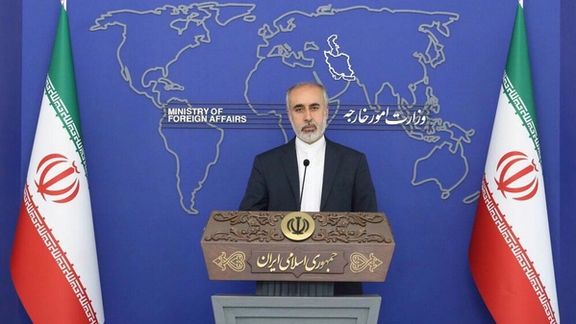
Iran has called criticism over its handling of popular protests “intervention” in its “internal affairs” and slammed Germany’s plans to list the IRGC as a terrorist entity.
Foreign ministry spokesman Naser Kanaani in his weekly briefing on Monday said that the Revolutionary Guard (IRGC) is an official military organization of the Islamic Republic and sanctioning it would be “a totally illegal act.”
“Statements by German officials about sanctioning the IRGC, following unconstructive and irresponsible actions by this country, emanates from their wrong approach toward the government and people of Iran,” Kanaani claimed. He added, Iran “hopes that Germany and other countries who have a plan in this regard, will pay attention to their unconstructive actions and not sacrifice their bilateral relations to passing political issues and emotional decisions.”
Iran’s security forces have killed at least 270 citizens since protests broke out in mid-September when a 22-year-old woman, Mahsa Amini was killed in ‘morality police’ custody. The government has deployed tens of thousands of regular IRGC troops, its Basij militia and plainclothes agents to attack protesters. Thousands have been arrested and more than 1,000 already indicted for participating in demonstrations.
German Foreign Minister Annalena Baerbock said Sunday that her country and the European Union were examining whether to classify Iran’s Revolutionary Guard as a terrorist organization for its use of violence in the protests.

"I made it clear last week that we will launch another package of sanctions, that we will examine how we can also list the Revolutionary Guards [IRGC] as a terrorist organization," Baerbock said in an interview with ARD broadcaster on Sunday.
The IRGC is already listed as a terrorist organization by the United States and Tehran tried hard during the long nuclear negotiations in 2021 and 2022 to have Washington lift the designation. The Biden Administration called such demands extraneous to the nuclear talks.
The negotiations have paused since August over Iran’s demands, which are unacceptable for the United States. When Tehran adopted its position in response to an EU draft proposal, protests had not started and now it finds itself in more international isolation than two months ago.
US and Albania have also proposed an informal UN Security Council meeting to discuss the situation in Iran. The format of the meeting is called the “Arria formula”, after its originator, Diego Arria, a Venezuelan ambassador who in 1992 initiated the first informal meeting of the Council to discuss the crisis in former Yugoslavia. The meetings take place in a non-rigid setup where member states can hear comments by individuals and non-state actors.
Iran’s foreign ministry spokesman on Monday dismissed the significance of the meeting and claimed that the aim of the meeting is to put “political pressure on the Islamic Republic,” and is the continuation of a clear policy of interference by the American government in Iran’s internal developments.”
Kanaani criticized the US for planning to ask Iranian expatriate activists to testify during the informal Security Council meeting, calling such individuals “known elements” with Iranian identity, who in the past never raised their voice against US sanctions.
The spokesman again repeated Iranian denials about supplying military drones to Russia used against civilian targets in Ukraine. Kanaani said that Tehran has never supplied weapons to the warring sides. The denials come as the United States and others have raised strong objections to the deployment of mostly suicide drones and Ukraine has produced evidence obtained from downed UAVs.
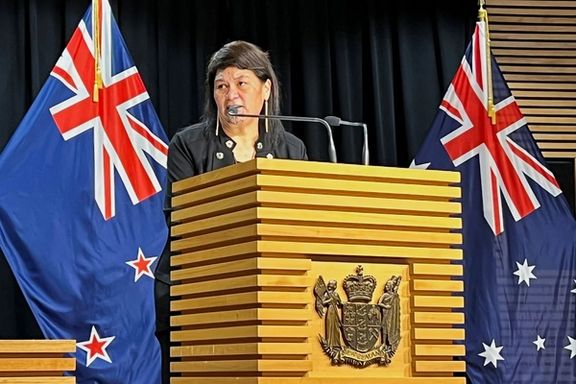
New Zealand has suspended its official bilateral human rights dialogue with the Islamic Republic, saying bilateral approaches were "no longer tenable" given Tehran’s gross violations.
In a statement on Monday, New Zealander Minister Foreign Nanaia Mahuta said the decision sends a strong signal that bilateral approaches on human rights were not tenable with the Islamic Republic, which has been denying basic human rights and violently suppressing protests sparked by the death of 22-year-old Mahsa Amini after she was arrested by the so-called morality police for attire deemed inappropriate.
She said, “Violence against women, girls or any other members of Iranian society to prevent their exercise of universal human rights is unacceptable and must end. This is clearly a difficult time for the people of Iran.”
Tehran and Wellington had established the dialogue in 2018 with the stated hope of advancing human rights issues and concerns, and held the first round of talks in 2021. The next round of negotiations was scheduled to take place later in 2022.
Last week, New Zealand’s officials confirmed that two New Zealanders, who had been detained in Iran for a number of months, had been released and were safe. The New Zealand government also last Wednesday updated its travel warnings for Iran and urged New Zealanders currently there to leave.
Amid nationwide unrest and widespread arrests, several foreigners visiting Iran have disappeared, confirming earlier reports that the Islamic Republic is taking foreign citizens hostage.
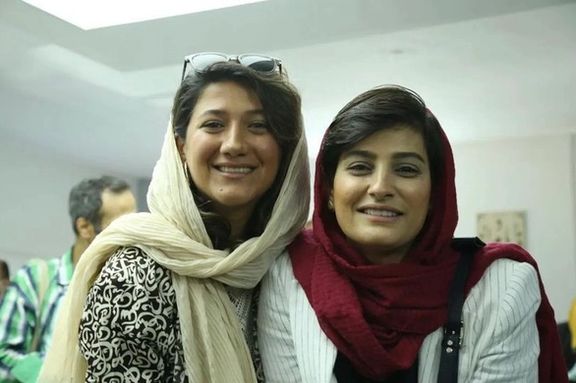
More than 300 Iranian journalists have demanded the release of two colleagues arrested over exposing police brutality that killed Mahsa Amini over ‘bad hijab.’
Their call came in a statement published by the Iranian Etemad and other newspapers on Sunday.
Iranian journalists and social media activists have also condemned a joint statement issued by the country's top intelligence organizations that accused the two female journalists of instigating "riots" in Iran by covering Amini’s death.
Iran's Ministry of information that operates under President Ebrahim Raisi's administration and the IRGC Intelligence Organization which operates directly under Supreme Leader Ali Khamenei and reports to him had in a joint statement on October 28 accusing Niloufar Hamedi and Elahe Mohammadi, two women journalists arrested days after protests began in September, of spying for several foreign agencies including the CIA, MI-6 and Mossad.
Many Iranian journalists, including Hassan Namakdoust Tehrani have pointed out that "what Hamedi and Mohammadi did was simply fulfilling their responsibility as journalists."
Reformist daily Sharq, for which Niluofar Hamid worked wrote: "Niloufar has been in jail for more than a month. Saturday, October 29 is her birthday, and we hope that she and all other journalist in jail return to their newspapers soon."
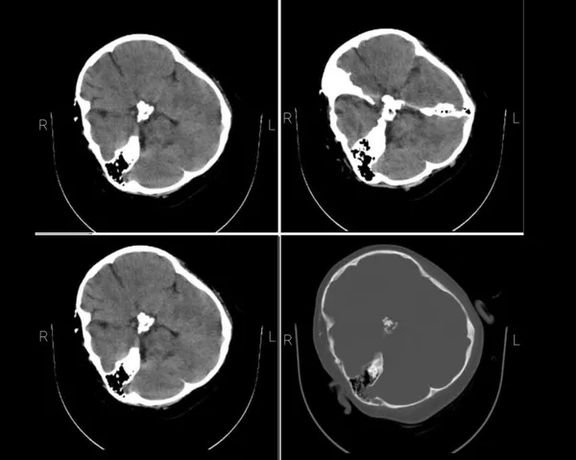
Meanwhile, Washington Post’s Jason Rezaian, an Iranian American journalist who was a hostage in Iran in mid-2010s and was released as part of a prisoner swap after the 2015 nuclear deal with the West, wrote on Saturday, "In a rare moment of agreement the Islamic Republic’s Ministry of Intelligence & the Intelligence unit of the IRGC issued a ridiculous statement claiming journalists Niloofar Hamedi & Elahe Mohammadi are agents of the CIA, MI6, Mossad, Saudi intelligence & several other countries."
Reformist commentator Abbas Abdi referred to the Iran intelligence agencies accusation that the two journalists were trained by foreigners to report on Mahsa Amini's death, wrote: "Sending a prominent journalist such as Elaheh Mohammadi to a training session to learn to report is like sending a person with a Ph.D. in mathematics to a class to learn the rules of multiplication."
The managing editor of Ham Mihan, the newspaper where Elaheh Mohammadi's report about Mahsa Amini's death was published wrote that her coverage was similar the the IRGC-linked Fars news agency's account of the event and what other agencies had reported at the time with even more details. Gholamhossein Karbaschi pointed out that it is not easy for a reporter to work in a security atmosphere.
He said the authorities have told him that the accusations against the journalist had nothing to do with her job as a journalist. Nonetheless, the statement by the intelligence organizations is about Ms. Mohammadi's role as a reporter, Karbaschi said, adding that this attitude toward journalism is not in the interest of Iran's media environment. Referring to the point the agencies made about the reporters' trying to be the first to break the news, Karbaschi said this is what every good journalist does, and the authorities had better change their attitude.
He added: "No news will remain concealed forever and it will reach the whole world soon." Kartbaschi pointed out that "It is in the interest of the country to have the right news disseminated by domestic press rather than creating a situation in which Iranians get the news first from foreign-based media," referring to Persian broadcasters abroad.
Prominent Iranian journalist Niloufar Ghadirian, the former editor of Hamshahri daily wrote: "Niloufar Hamedi and Elaheh Mohammadi will be always remembered as honest, brave and dedicated journalists. Their names will be remembered in journalism courses for many years."
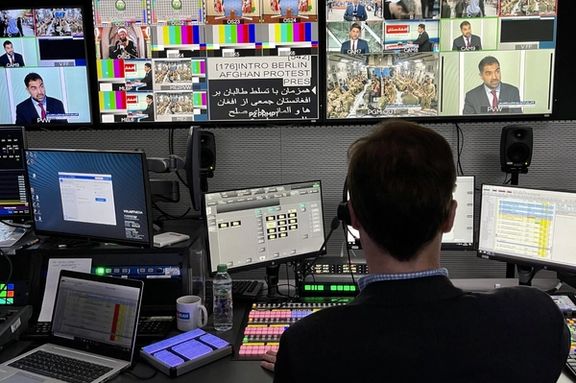
Iran on Monday called Iran International’s coverage of events “similar to a terrorist media” and vowed to follow up the issue through legal and diplomatic channels.
Foreign ministry spokesman Naser Kanaani in his weekly media briefing likened Iran International’s coverage of recent protests to “a war room” and an “operations room against the nation of the Islamic Republic of Iran.” This is the first time that an Iranian official uses the term “Islamic Republic nation”, instead of the Iranian people or the Iranian nation.
The Islamic Republic regards broadcasting in Persian from abroad as hostile because media outlets such as the BBC Persian, Voice of America, Iran International, Radio Farda (RFE/RL) and others break the monopoly over news and information the government in Iran has imposed since 1979.
Since the ongoing antigovernment protests began in mid-September, all media in Iran that are either owned or controlled by the state have largely ignored or misrepresented the popular movement, calling it lawlessness and riots. The Islamic Republic wants to suppress the news about protests and has all but shut down access to the Internet.
The accusation against Iran International comes while earlier Supreme Leader Ali Khamenei called the protests "unimportant".
Kanaani insinuated that Iran International belongs to Saudi Arabia and that Tehran has complained to Riyadh about the network in the past.
Iran International and its sister channel, Afghanistan International, are “editorially independent television channels owned by Volant Media,” a company based in London and owned by a Saudi Arabian/British citizen; it has no state backing or affiliation.
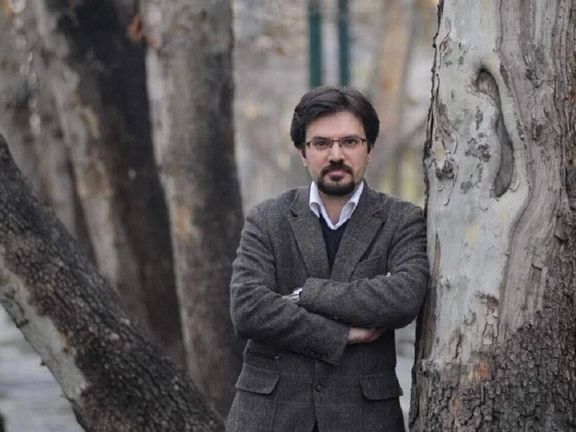
A well-known whistleblower and investigative journalist in Iran says people in the Islamic Republic political system are not accountable for their performance.
Yashar Soltani, who has spent some time in jail in 2016 for disclosing financial corruption at Tehran Municipality under current parliament speaker Mohammad Bagher Ghalibaf, added in an interview with Etemad Online that the way government treats financial corruption is woefully disappointing.
The multi-billion dollar case involving the former mayor, a figure close to Supreme Leader Ali Khamenei, ended in the arrest of Isa Sharifi, one of Ghalibaf's deputies and was finally pushed under the carpet although Khamenei in 2018 called for investigation into the case. Sharifi's name came up once again in February 2022 along with Ghalibaf's in a major corruption case at the IRGC, which also remained inconclusive after a few weeks of controversy stirred by rival political factions in Iran.
The controversy about the IRGC corruption case was silenced soon possibly because even former IRGC Qods Force Commander Qasem Soleimani was also involved, as revealed in an audio tape that was leaked in the public domain presumably by those who benefitted from the revelations.
As a whistleblower who has been exposing financial corruption in Iran since the 1990s, Soltani says that corrupt individuals have never left the system even after their performance was exposed, and corruption is constantly on the rise. He added that the Iranian justice system discriminates in favor of corrupt individuals when they are close to the core of the regime, namely Khamenei's household.
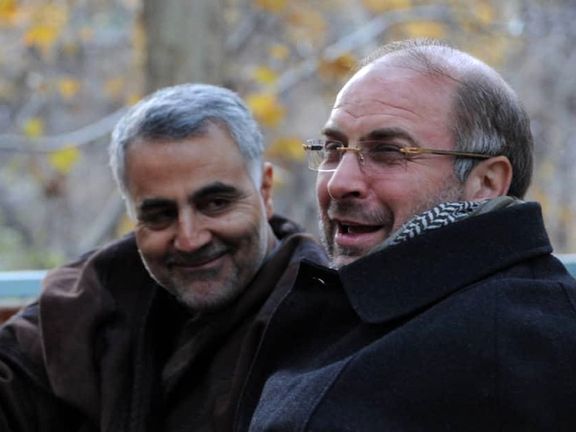
He said: "Fighting corruption is part of the people's demands as the magnitude of government corruption is so high that the regime has no way but to try to control it through introducing reforms in the system." However, he acknowledged that most of the rhetoric about fighting government corruption is just a show, often with the intention of winning the people's attention at election times or to calm the situation when there are major protests.
Soltani pointed out that while corruption trials were held openly and the people could watch hearings on live TV in the 1990s, corruption cases are now shrouded in an aura of secrecy. Soltani reiterated that as long as talk about corruption is aimed at beatifying the political system or garnering support for a group of candidates, there will be no hope in controlling it.
Nonetheless, there seems to be some progress in the process. "When I disclosed the astronomical real estate case [in Tehran municipality] in 2016, I was jailed immediately, but five years later I was called for consultation for writing a new law to prevent that kind of corruption as part of which the Municipality gave land and buildings to influential individuals to garner their support," Soltani recalled.He added that regardless of his help, the Iranian Judiciary has been summoning him during the past 11 years to subtly warn him about his whistleblowing activity.
"They ask why me and not the intelligence agencies investigate a case. Well, the intelligence agencies did their own research but what they got nowhere because there are flaws in the structure of the government," he said, adding that, "There are only four or five people who continue as whistleblowers, and all of them like me work single-handedly without any support from anyone in the system."
Referring to the problems in the system, he said the corruption case at the Petrochemical Complex (PCC) was a major case. But there were a few stage-managed court sessions and nothing more happened.
He was referring to a case of hundreds of million of dollars embezzled by officials who were tasked to sell Iran’s petrochemical products through obscure channels and return the money to the treasury during international sanction in 2010-2013.
Soltani concluded: "There are so many inconclusive cases about financial corruption in Iran. In a corrupt structure you cannot claim to be dealing with corruption."
Nikol Pashinyan and Ebrahim Raisi held a joint press conference following their meeting, reiterating their goal to improve bilateral relations and sign documents for strengthening cooperation.
Raisi said he was sure the visit by the Armenian official will be a turning point in enhancement of bilateral relations, claiming that their trade exchanges have grown by 43 percent over the past few months.
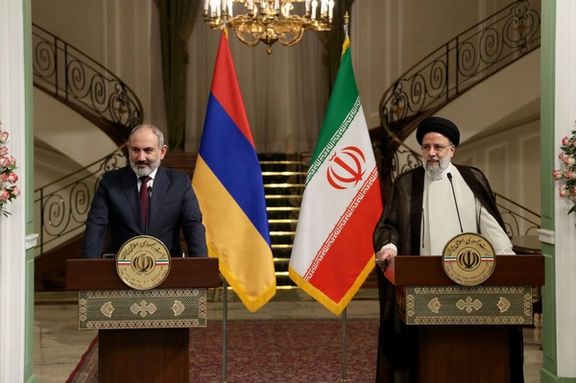
In October, the Islamic Republic opened a consulate in Armenia's Syunik province, which includes Armenia’s narrow southern strip called Zangezur where it has a land border with Iran.
Azerbaijan, backed by Turkey, demands a transit corridor through Syunik province to have access to its Nakhichevan Autonomous region without Armenian checkpoints.
However, Yerevan objects to the concept saying that it is a breach of the ceasefire signed after the 2020 Nagorno-Karabakh war, that Azerbaijan won, taking back vast territories that Armenia had conquered in the Nagorno Karabakh conflict in the early 1990s.
Iran supports Yerevan in this dispute as it might lose its only joint border with its de facto ally Armenia and Caucasus. In mid-September, Iran warned that it would not tolerate any seizure of territory from Armenia by Azerbaijan.
Armenia accuses Azerbaijan of attacking its towns to avoid negotiations over the status of the mainly Armenian-populated enclave of Nagorno-Karabakh in Azerbaijan, an enclave which is inside Azerbaijan but populated mainly by ethnic Armenians.
Tehran in the past has also expressed alarm at alleged Israeli military presence in Azerbaijan.